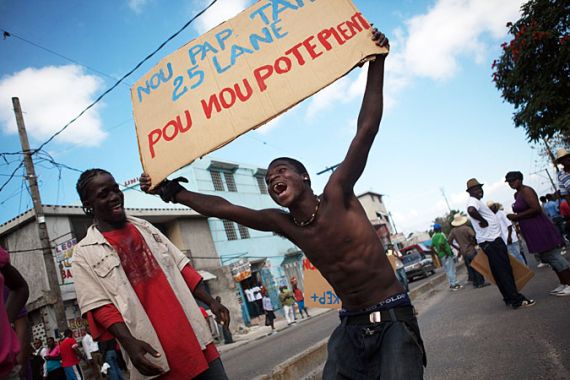
Did Haiti’s Duvalier get away with murder?
As Jean-Claude Duvalier escapes trial for crimes against humanity we ask if his victims will be happy to reconcile.
Human rights groups have condemned a decision not to try Jean-Claude Duvalier, Haiti’s former ruler, on crimes against humanity.
A Haitian judge decided this week that Duvalier, known as Baby Doc, should not stand trial for crimes against humanity.
|
“We cannot have reconciliation without justice. Those people who have committed the crime including Duvalier ought to be tried, and the nation ought to find out exactly what happened. We owe it to all those people who died. … I don’t things are going to change anytime soon because the institutions in the country are not working … the US policy has always been to have a weak government in the country.” – Jean-Yves Point-du-Jour, Haitian American radio host |
He is accused of the torture and murder of thousands of his own people during his 15 year rule in the seventies and eighties.
A year ago, Duvalier made a surprise return to the country after 25 years in exile.
The judge ruled that his alleged crimes fell outside Haiti’s statute of limitations. The judge, however, did say that Duvalier should stand trial on corruption charges. He is accused of embezzling hundreds of millions of dollars during his rule.
In heavily criticising the decision, human rights groups say they gave prosecutors hundreds of documents detailing cases of abuse.
Human Rights Watch called it the most important criminal case in Haitian history.
Duvalier was only 19 when he was named Haiti’s president for life in 1971 after the death of his father Francois – known as Papa Doc.
|
“According to a fairly-settled principle of international law that is binding on Haiti the statute of limitations does not apply if it’s a crime against humanity, if it’s a widespread political attack against civilians. The Inter-American Court of Human Rights, which jurisdiction Haiti has accepted, has clearly said the same thing, and that the government has an affirmative obligation to prosecute.” – Brian Concannon, Institute for Justice and Democracy in Haiti |
Human rights groups say the Duvaliers used paramilitary group Tonton Macoutes to torture opponents and kill 30,000 people during their combined 29-year rule.
During Baby Doc’s 15 years in power, hundreds of political prisoners were allegedly tortured or disappeared in prisons collectively known as the triangle of death.
Duvalier is also accused of embezzling between $300m-$800m of government assets. His upcoming trial is only on corruption allegations.
Meanwhile, the United Nations – which has its own troubled history in Haiti – has also condemned the ruling.
But it is likely to please Michel Martelly, Haiti’s current president, who has close connections with Duvalier and has supported him since his return.
So, is reconciliation better than justice in Haiti? Will Duvalier’s victims ever see justice served?
Inside Story Americas, with presenter Shihab Rattansi, discusses with guests: Kim Ives, a journalist with Haiti Liberte; Jean-Yves Point-du-Jour, a Haitian American radio host; and Brian Concannon, of the Institute for Justice and Democracy in Haiti.
|
“The model that we see coming from Martelly is exactly Duvalier’s model – sweatshops, tourism – this is how Haiti is supposedly going to develop, a model that we have seen crash and burn many times before. Haiti is one country that set a bad example for the entire hemisphere, so Haiti has this role of being sort of a vanguard nation … that’s why it is now the one military-occupied country in the western hemisphere, they [the US] have to keep it clamped down.” – Kim Ives, journalist with Haiti Liberte |